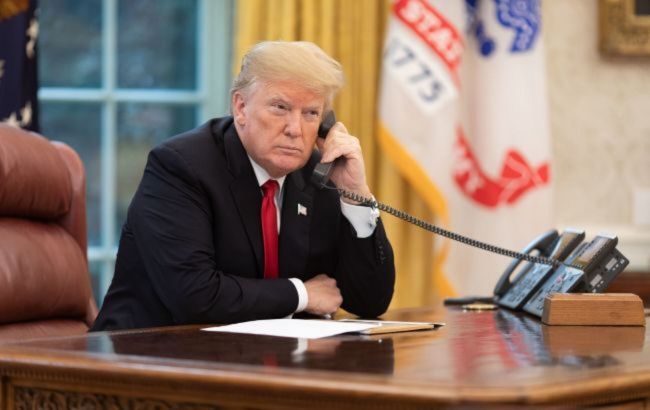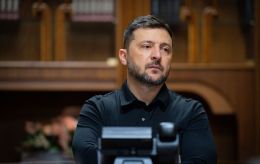Why Trump called Putin and what Zelenskyy says about it
 Photo: Donald Trump, President of the United States (flickr.com)
Photo: Donald Trump, President of the United States (flickr.com)
Today, May 19, US President Donald Trump held a series of phone talks focused on ending the war in Ukraine. He first spoke for over two hours with Russian President Vladimir Putin, and later discussed the situation with Ukrainian President Volodymyr Zelenskyy and leaders of European countries.
RBC-Ukraine summarizes the key statements from all sides below.
Takeaways:
- What were the main topics of the talks?
- What did Putin say after speaking with Trump?
- How did Ukraine respond?
Trump called Putin and Zelenskyy
On May 19, US President Donald Trump held a phone conversation with Kremlin leader Vladimir Putin.
According to Russian presidential aide Yury Ushakov, the call lasted 2 hours and 5 minutes and was the third between the two since Trump assumed office. "Both Putin and Trump didn’t want to end the conversation or hang up the phone," Ushakov noted.
In addition, Donald Trump called Ukrainian President Volodymyr Zelenskyy both before and after speaking with Putin. The second call also included European leaders: European Commission President Ursula von der Leyen, French President Emmanuel Macron, Italian Prime Minister Giorgia Meloni, German Chancellor Friedrich Merz, and Finnish President Alexander Stubb.
Russia's position
Kremlin leader Vladimir Putin was the first to comment publicly on the outcome of the talks with the US president. He described the conversation with Trump as "very substantive and very frank" and, in his view, "very useful." He thanked Trump for supporting the resumption of direct talks between Russia and Ukraine.
"The President of the United States presented his position regarding a cessation of hostilities and a ceasefire, and stated that Russia also supports a peaceful resolution to the Ukrainian crisis," Putin said.
According to the Kremlin chief, the most effective path toward peace must be determined, and the Russian side is allegedly prepared to work on a memorandum for a possible peace agreement, including a potential temporary ceasefire if relevant agreements are reached.
He expressed the belief that both the Russian and Ukrainian sides must "demonstrate maximum commitment to peace and find compromises that would satisfy everyone." At the same time, Putin again emphasized the importance of addressing the "root causes" of the crisis.
"I want to note that Russia’s position is clear. Our main goal is to eliminate the root causes of this crisis," he concluded.
Putin’s aide Yury Ushakov later clarified that no specific timeline for a ceasefire was discussed, though the Ukraine issue was covered "in great detail and with interesting nuances."
They also discussed US-Russia bilateral relations and expressed interest in normalizing them. According to Ushakov, Trump said he views Russia as one of the key trade and economic partners for the US after a settlement in Ukraine. Putin, in turn, praised Trump and his administration’s role in bringing Kyiv back to the negotiating table.
Additionally, the two leaders talked about a possible prisoner exchange between Russia and the US - 9 people on each side.
Ushakov also stated that Putin and Trump agreed to continue their dialogue on all issues, including Ukraine, though no date or location has yet been set for an in-person meeting.
What Trump said after talking to Putin
After his call with Putin, Donald Trump said the conversation went "very well" and that Russia and Ukraine will "immediately start negotiations toward a ceasefire and, more importantly, an end to the war."
"The conditions for that will be negotiated between the two parties, as it can only be, because they know details of a negotiation that nobody else would be aware of. The tone and spirit of the conversation were excellent. If it wasn't, I would say so now, rather than later," Trump stated.
The US president also said he sees Russia as one of the key trade and economic partners for the US after the war ends.
"Russia wants to do large-scale trade with the United States when this catastrophic 'bloodbath' is over, and I agree. There is a tremendous opportunity for Russia to create massive amounts of jobs and wealth. Its potential is unlimited. Likewise, Ukraine can be a great beneficiary on trade, in the process of rebuilding its country," the president added.
Ukraine's reaction
Ukrainian President Volodymyr Zelenskyy confirmed that he held two phone calls with Trump - one before and one after Trump’s conversation with Putin.
"We discussed what is very important for Ukraine: a ceasefire and the issues we’ve talked about in Istanbul and continuously before that. Secondly, the US's readiness to take more serious sanctions measures," Zelenskyy said.
He emphasized that he asked Trump not to make decisions about Ukraine without Ukraine’s participation and urged for increased sanctions against Russia if it refused a peaceful settlement.
During the second call, the presidents of France, Italy, Finland, Germany, and the European Commission president joined the conversation.
Following the talks, Zelenskyy noted that Trump sees a key role for direct negotiations between Kyiv and Moscow.
"My understanding is that President Trump believes direct talks between Ukraine and Russia are the most important. That’s his position, and he made it clear. We talked about it at length. Ultimately, he believes the Russian side will send signals indicating how a ceasefire and next steps might look from their perspective," said Zelenskyy.
The Ukrainian president also expressed concern about possible conditions Russia may put forward during negotiations. He asked Trump to treat any unacceptable proposals from Russia as a sign of its unwillingness to end the war.
"We’d like to have the opportunity to discuss this and for the US to interpret it as Russia’s unwillingness to end the war if certain difficult conditions are proposed," he emphasized.
At a briefing following the call with Trump, Zelenskyy stressed that the US position would be key in determining whether Russia can continue to finance the war.
"A lot depends on America - whether Putin and the Russian army will keep profiting from this war," he said, referring to the need for banking and energy sanctions.
Zelenskyy said that the memorandum discussed by Trump and Putin could become the basis for an agreement that "could lead to a roadmap toward ending the war, toward a peace deal."
According to him, once Ukraine receives appropriate signals from Russia, it will be able to formulate its vision of such a memorandum.
At the same time, Zelenskyy stated that Ukraine would not withdraw troops from its own territory, as Russia demands, since defending the country’s sovereignty and territorial integrity is a constitutional duty of both the president and the military.
He pointed out that some territories are currently under temporary occupation due to Russian aggression, but Ukraine would not comply with any ultimatums.
"If Russia demands that we withdraw our troops from our own land, then it’s clear they don’t want a ceasefire or to end the war - because they know perfectly well that Ukraine will not do that," Zelenskyy added.
The president also stressed that Ukraine would not discuss adopting a neutral status in exchange for ending the war. Zelenskyy said Ukraine’s constitution enshrines the country’s course toward NATO membership, which contradicts neutrality.
He also noted that Ukraine is considering new negotiations with Russia in a format that includes the US, Ukraine, Russia, and European representatives. Possible venues include Türkiye, the Vatican, and Switzerland.
Ukraine-Russia talks
Ukraine and Russia held negotiations in Istanbul on Friday, May 16. At that time, the two sides agreed on a prisoner exchange - 1,000 for 1,000.
Ukrainian and Russian officials also discussed the possibility of a meeting between President Volodymyr Zelenskyy and Vladimir Putin.
Ukraine’s Defense Minister Rustem Umerov, who leads the Ukrainian delegation, said that organizing a summit would be the next step.
Meanwhile, media reports said that the Kremlin insisted during the talks that Ukraine withdraw its troops from the Donetsk, Luhansk, Zaporizhzhia, and Kherson regions. Only under that condition would the Russian side agree to a ceasefire.
Sources: statements by President Volodymyr Zelenskyy at a briefing, statements by Russian President Vladimir Putin, reports by Russian media, and US President Donald Trump’s posts on TruthSocial.

